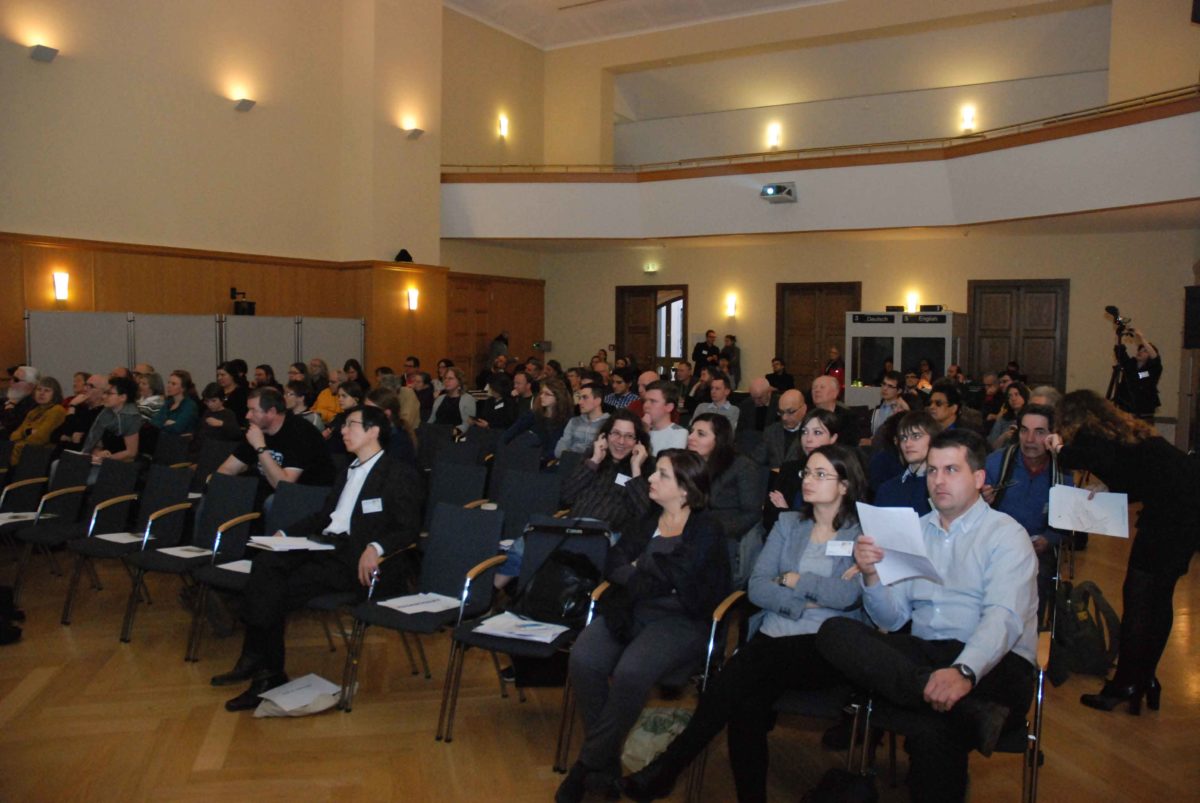About This Project
Gedenken in Dresden
02.14.2015
On the occasion of the commemoration of the 70th anniversary of the bombing on Dresden, the Jugend- & Kulturprojekt e.V. organises the conference GEDENKEN IN DRESDEN (Remembering in Dresden) in cooperation with the organisation IG 13. Februar e.V., the European and International Affairs Division of the Mayor of Dresden and with the Culture of Remembering Division of the Cultural Department of Dresden in the Kulturrathaus Dresden on the 14th of February.On the occasion of the commemoration of the 70th anniversary of the bombing on Dresden, the Jugend- & Kulturprojekt e.V. organises the conference GEDENKEN IN DRESDEN (Remembering in Dresden) in cooperation with the organisation IG 13. Februar e.V., the European and International Affairs Division of the Mayor of Dresden and with the Culture of Remembering Division of the Cultural Department of Dresden in the Kulturrathaus Dresden on the 14th of February.
During the conference, the way of remembering in Dresden on the 13th of February will be discussed with praticipation of specialist representatives of politicy and society as well as international guests of Dresden’s twin cities and Bologna, Budapest and Thessaloniki.
- History of the 13th of February
- Culture of remembering in Dresden
- Culture of remembering in the twin cities
- Argumentation about the perception of the 13th of February abroad
Furthermore, there will be a world café including an exchange between experts and citizens of Dresden.
The conference is open to the public and all interested parties are cordially invited to attend.
‘Gedenken in Dresden’ is part of ‘Bridging Generations’, a two year international project that examines the influence of the Second World War on national identities within Europe. Bridging Generations analyses how collective memory can be used to improve mutual understanding within different cultures and how a peaceful Europe can be developed.
Information at a glance:
Languages of the conference: German and English (with translation)
Venue: Clara Schumann Hall in the Kulturrathaus Dresden
Date: 02.14.2015
Start of the conference: at 4:00 pm
Barrier-free access: yes
The conference on facebook
Bridging Generations on facebook
Programme:
16.00 – 16.05 Welcoming by the committee of Jugend- & Kulturprojekt e.V.
16.05 – 16.15 Presentation about the project Bridging Generations by the project manager
16.20 – 16.25 Welcoming and speech by the representative of the municipality of Dresden
16.30 – 16.50 Experience, Narration, Symbol and Legend. The 13th of February in Dresden
16.55 – 17.10 Cultures of Remembrance and their Media. Dresden 1945 as an example
17.15 – 17.25 Presentation about the culture of remembrance in Greece (Thessaloniki)
17.30 – 17.40 Feature: How was the Second World War interpreted in the art?
17.45 – 17.55 Presentation about the culture of remembrance in Poland (Wroclaw)
18.00 – 18.10 Presentation about the culture of remembrance in Hungary (Kistarcza)
18.15 – 18.25 Presentation about the culture of remembrance in Italy (Bologna)
18.30 – 18.40 Presentation about the culture of remembrance in Great Britain (Coventry)
18.45 – 20.00 Discussions/Workshops at six tables – cultural exchange
1 Remembrance and Identity
2 Remembrance and Art
3 Remembrance and Symbols
4) Remembrance and Memory
5) Remembrance and Politics
6) Remembrance and Peace
The speakers on the conference:

Dipl. Ing. Matthias Neutzner
– 54-year-old engineer and social scientist. Researcher in the fields of history, politics of history and culture of remembrance
– Chairman of the interest group “February 13, 1945”, an intergenerational peace initiative
– Several monographs and book chapters about the history of Dresden in Nazism and World War II and the related cultures of memory
– 2008 to 2012: Employee in European science project “Identity and Conflict. Cultural Heritage and The Re-Construction of Identities in Post-Conflict”- Co-founder of the Forum ERINNERN GESTALTEN (shaping of memory) Dresden
At the international conference “Gedenken in Dresden”: presentation about “Cultures of Remembrance and their Media. Dresden 1945 as an example” and leads the workshop “Remembrance and Symbols”

Prof. Susanne Vees-Gulani
– Associate Professor of German and Comparative Literature in the Department of Modern Languages and Literatures at Case Western Reserve University, Cleveland, USA
– Her research focuses on 20th and 21st Century German literature and culture, the Second World War, postwar reconstruction and identity formation, trauma and memory studies, and science and literature
– Author of “Trauma and Guilt: Literature of Wartime Bombing in Germany” (2003) and co-editor of “Generational Shifts in Contemporary German Culture” (2010)
– Awarded a National Endowment for the Humanities Fellowship to work on her book project about the origins and manifestations of the German victim discourse surrounding Dresden
At the international conference “Gedenken in Dresden”: leads the workshop “Remembrance and Literature”

Prof. Dr. phil. Karl-Siegbert Rehberg (*2th of April 1943 in Aachen)
– Since 1992: founding professor of sociology and professor of Sociological Theory, History of Theory and Cultural Sociology at TU Dresden
– Scientific head of the Dresden School of Culture in the Dresden International University, director of the Dresdner Institut für Kulturstudien e.V. (institute for cultural studies) and member of the saxon Senate and Council of Culture of Dresden
– 2013 honorary membership of the department „Cultural Sociology” of the German Society of Sociology
At the international conference “Gedenken in Dresden”: presentation about “Experience, Narration, Symbol and Legend. The 13th of February in Dresden” and leads the workshop “Remembrance and Identity”

Prof. Eiichi Kido (*1957 in Kashiwa, Chiba Prefecture)
– Political scientist and professor at the State University of Osaka, Japan (University lecturer in the Department of German politics)
– As a peace activist fights against the remilitarization of Japan
– Research in Berlin, proofreading for the German Academic Exchange in Leipzig
– Published i. a. a work about the history of the GDR “Reflections on the Politics of History in Germany to the GDR past” and a book “The remilitarization of Japan after 1945. Return to a militant nationalism?”At the international conference “Gedenken in Dresden”: leads the workshop “Remembrance and Politics”

Prof. Andrew Rigby
– Emeritus Professor of Peace Studies at Coventry University where he was the founding director of the Centre for Peace and Reconciliation Studies
– As a pacifist he has had a life-time interest in nonviolence and nonviolent change, this led to an interest in the importance of memory and memorialisation as a driver of violence and nonviolence
– His main regional interest focuses on the Israeli
-Palestinian conflict and he has just finished a book on Palestinian popular resistance against occupation
– He published i.a. the article: “Memorialising war: the narratives of two European cities, Coventry and Dresden”At the international conference “Gedenken in Dresden”: leads the workshop about “Remembrance and Peace”

Prof. Xenofon Sachinis (*1954, Greece)
– 1973-1978: Studied at the Fine Arts School of Athens; currently Professor of Printmaking- 2011-2014: Chairman of the Visual and Applied Arts Department of the Aristotle University of Thessaloniki, Greece, since 2014: Dean of the Fine Arts Faculty of this Institute
– Published two books concerning the concept of the contemporary printmaking
– Exhibition of his worldwide exhibitions (e. g. USA, France, Spain, Sweden, Slovakia, Japan, Egypt, etc.)At the international conference “Gedenken in Dresden”: presentation about “How was the 2nd World War interpreted in the art” and leads the workshop “Remembrance and Art”

Prof. Pavlos Pantazis
– Social Psychologist and Associate Professor at the Film Department of theSchool of Fine Arts of Aristotle University of Thessaloniki in Greece- Scientific coordinator and research associate in research programs
– Published 46 scientific publications (books, chapters in books, journal articles,papers in conference proceedings, scientific reports)
– Has been a member of the organizing/scientific committee in twenty (20) Greekand international scientific conferences
– Has been a guest speaker in 66 (45 Greek and 21 international) conferences
At the international conference “Gedenken in Dresden”: presentationabout “the culture of remembrance in Greece (Thessaloniki)” and leads the workshop “Remembrance and Memory”

Piotr Michałowski (*1983)
– 2007: graduated Cultural Studies at the University of Wroclaw- 2010: finished the postgraduate studies “Administration and Entepreneurship in Culture”
– 2011: finished Wroclaw´s School of Jazz (educated in Jazz guitar)
– Coordinating projects with all generations, mostly for elderly people, and projects with the aim to encourage inhabitants of the community to establish new societies, promoting an idea of democracy and networking, moderator and strategic consulatnt for cultural institutions, creator of international musical projects
– Chairman of an european network of culture centres (ENCC) based in Brussels
At the international conference “Gedenken in Dresden”: presentation about “The culture of remembrance in Poland (Wroclaw)” and he will play a small concert at the end of the conference

“Different crowds clamor” – interdisciplinary music performance
There is a famous peace “Different trains” by American minimalist composer, Steve Reich, whose idea is related to different trains that transported people in Europe during the WWII. Some trains gave shelter and rescued people,some other trains took people to death and concentration camps…
Crowded streets are an obvious fact in our surroundings and localities (from Tokyo to New York, from Warsaw to Madrid, from Helsinki to Cape Town). The clamor of the crowd is then really different, depending on the circumstances. Some clamors may be heard as merchants’ quarrel, some as a crowded street on a Monday morning. Some crowds are demanding, some make war and some others revolve. The most interesting part of this piece is the clamor of the crowds between 1915 and 2015.
During this fifteen-minute performance, the audience will be able to experience a collage of the original soundscapes/fonosfaires and photos of the prewar markets and streets, then of the WWII, with sounds from occupied Warsaw, the war in Wrocław and Dresden, finishing then nowadays, with contemporary soundscapes from the crowded streets of the city of Wrocław. Through a live guitar performance by Piotr Michałowski the audience will travel back to the prewar time and during the WWII where they will experience the clamor of crowds.
Collages, playing & composition: Piotr Michałowski
Wrocław, 2015

Partners:
the Department of European and International Affairs of the Municipality Dresden
the Culture of Remembering Division of the Cultural Department of Dresden
Aristoteles University – Thessaloniki, Greece
Kistarcsa Város Önkormányzata – Kistarcsa, Hungary
Gminny Osrodek Kultury Olesnica – Wroclaw, Poland
YouNet NGO – Bologna, ItalyAddArt NGO – Thessaloniki, Greece
Herzen University – Sankt Petersburg, Russia
Center for Youth Activism CYA KRIK – Skopje, Mazedonien
Universität Coventry – Coventry, Großbritannien
Universität Ostrava – Ostrava, Tschechische Republic
International Center for Southern Europe – Florenz, Italien
Foundation for the European Studies – Wroclaw, Poland
The conference is funded by the European and International Affairs Division of Dresden, the Local Acting Programme for Democracy and Tolerance and the european programme Europe for Citizens.
The management of the conference is supported by the organisation IG 13. Februar e.V.
The conference is part of the project “Bridging Generations” which takes place under the patronage of the Mayor of Dresden, Helma Orosz.
schirmherrschaft_ob_bridging_generations.pdf
newsletter_dresden_international_januar_2015.pdf
pressemitteilung_konferenz_gedenken_in_dresden.pdf
flyer_kontaktstelle_deutschland_europa_fuer_buergerinnen_und_buerger.pdf






